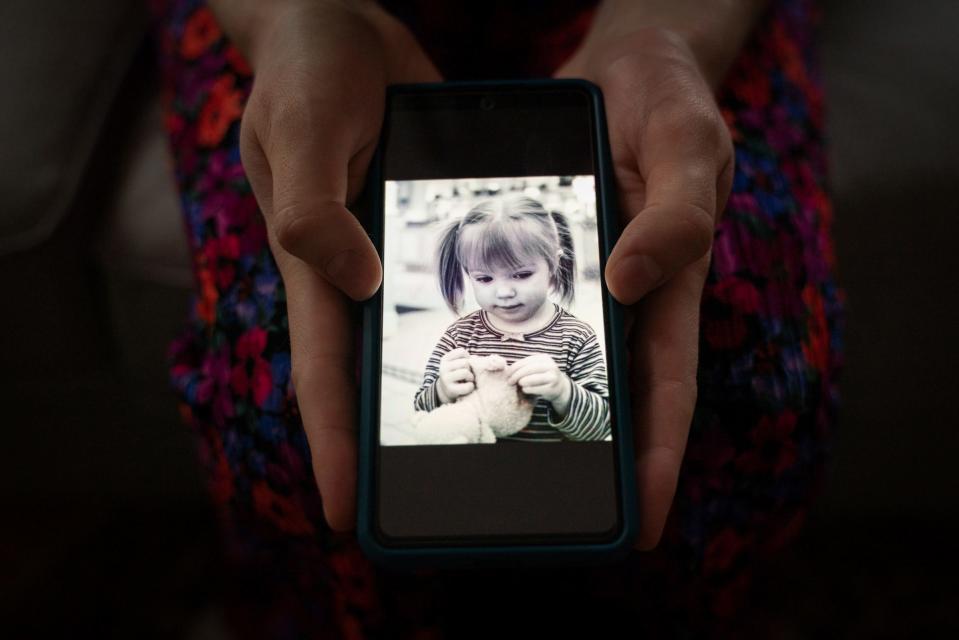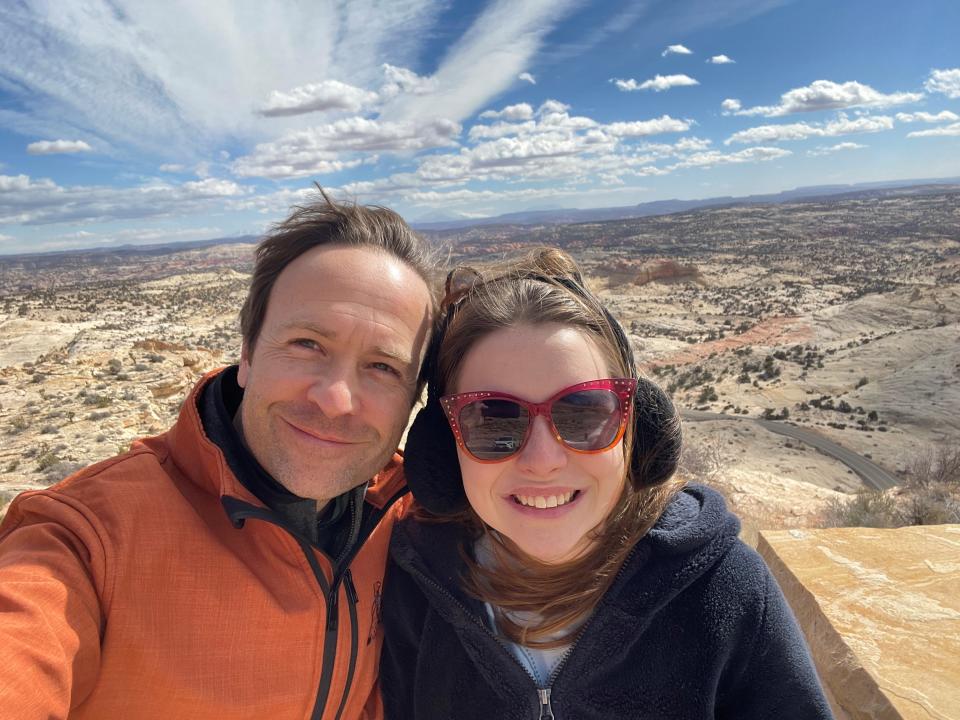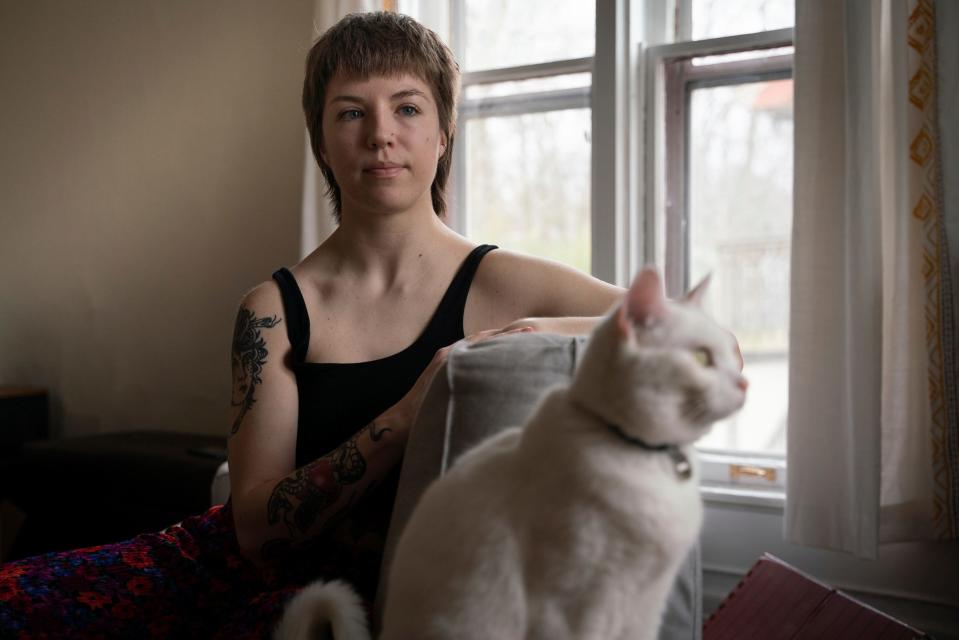When autism isn't diagnosed until adulthood: 'It takes a mental crisis to get diagnosed'
DETROIT – It wasn't until Ashley Marchuck started experiencing frequent anxiety attacks at work – almost every day – that she started to suspect she might be autistic.
Working at Starbucks, she was bombarded with loud noises such as the whirr of the coffee machines, the music playing, and the conversations among customers. The sensory overload was too much. The anxiety attacks, leaving her sweaty and panicked, wouldn't stop.
Marchuck took a leave of absence to figure out what was going on. At 31 years old, she was diagnosed with autism spectrum disorder. Marchuck realized that her anxiety attacks were a symptom of sensory issues related to autism, she said.
"It basically takes a mental crisis to get diagnosed," Marchuk, now 32, said. "And that's how it was with me, unfortunately, you know, having those anxiety attacks for months."
While autism is traditionally associated with diagnosis in childhood, more and more adults on social media say they are autistic. But data on adult diagnoses in the U.S. does not appear to exist.
Women and people of color have often been overlooked in diagnoses and in stereotypical depictions of autism in media, said advocates and autistic adults. And those missed diagnoses have left some for decades without help in higher education or the workplace.
AUTISM RATES RISE AGAIN: Why experts say many kids are still 'invisible to the system.'
AUTISM ACCEPTANCE MONTH: Here’s what autistic advocates want you to know, and do.

Why some go without a diagnosis
Definitions of autism have evolved significantly over the past several decades, with more research into the condition and the elimination of Asperger's syndrome from the diagnostic manual that medical professionals use.
Toby Kellk, a clinical psychologist in Huntington Woods, Michigan, started working with children but more recently has begun evaluating adults for autism spectrum disorder. In many cases, she has evaluated adults who likely had fewer support needs as children and who flew under the radar until they were older.
"Our conceptualization (of autism) really was geared towards more of a population that had higher support needs," Kellk said. "This idea of adults who have functioned incredibly well didn't really align with our idea."
But adults diagnosed past childhood said they wished they'd known sooner, because they would have had a better understanding of social issues.
Leah Wathen, 23, said she spent much of her life masking autistic traits and feeling uncomfortable in social circumstances but never knowing why. For Wathen and others, masking autistic traits can be exhausting and research suggests may be linked to anxiety.
In school, Wathen would try to mirror her peers to fit in, taking on personality traits that were not her own.
"I just always felt kind of disconnected," she said.
Stereotypes about behavior, particularly in Black children, also contribute to missed autism diagnoses, according to advocates.
Camille Proctor, founder of The Color of Autism, a national nonprofit based in metro Detroit dedicated to assisting Black families with autistic children, said behavioral issues in Black children are often labeled as "problems" in school and not flags for a possible autism diagnosis.
"You'll have a Black child and then they will exhibit certain behaviors, and immediately that child is labeled as oppositional defiant," she said. "But a white child with that same behavior will get an autism diagnosis or a referral to get an autism evaluation."
But in recent years, data has shown a possible shift in the demographics of children diagnosed with autism, according to the Centers for Disease Control and Prevention.
According to the data, a higher percentage of Black, Latino, and Asian 8-year-olds compared to white 8-year-olds were diagnosed in 2020 – which could indicate that diagnoses are becoming more inclusive.

How parents can advocate in school
While schools can conduct an evaluation to determine whether a student is eligible for special education services, Proctor also recommends an outside diagnosis through medical or mental health providers. Her organization helps train parents to become strong advocates for their children.
"You have to have an informed parent for them to be an advocate for their child," she said.
The Michigan Alliance for Families recommends parents put into writing their requests to schools for evaluations, and asking for an evaluation early on, as issues – such as behavioral complaints from teachers – arise.
"Don't wait until things are horrible," said Michelle Driscoll, policy coordinator for the Michigan Alliance for Families. "Have that conversation with the teacher and administrator. ... And put that request in writing. It's not required, but just to document what the concerns are. Make the request for a comprehensive initial evaluation for eligibility for special education services."
But identifying autism sooner also comes down to public policy.
Brian Calley, former Michigan lieutenant governor and vice chair of the Autism Alliance of Michigan Board of Directors, said identification will expand as early childhood programs expand in the state. And he said pediatricians are conducting more developmental screenings but noted that such screenings won't help vulnerable populations who can't regularly go to the pediatrician's office.

Reducing stigma around autism
Calley, who is the father of a child with autism, added that society also needs to reduce the stigma around the condition. He remembers feeling unsure about seeking a diagnosis at first for his child, fearing what a diagnosis could mean.
"There's still some of that, that happens where people might notice that there's issues challenges, problems, delays, and not ready to seek a diagnosis because of societal stigma," he said.
For Wathen, the benefits of a diagnosis far outweighed any discomfort, she said. She is actively working to raise awareness against the stigma that comes with being neurodivergent.
"There's so much education that needs to happen in terms of getting us to a place where people actually understand neurodivergent people and see them as different rather than something that's inherently less than," Wathen said.

Contact Lily Altavena: laltavena@freepress.com.
This article originally appeared on USA TODAY NETWORK: Autism diagnosis in adulthood: 'Takes a mental crisis'

